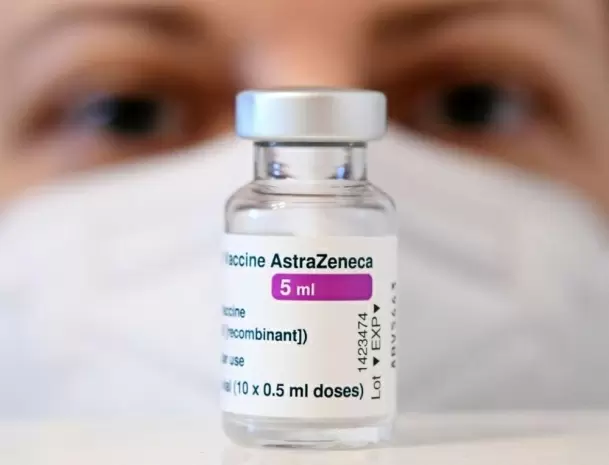AstraZeneca's nasal vax prevents Covid spread in animal models
London
30-July-2021

Photo:IANS
AstraZeneca's intranasal Covid vaccination reduced virus concentrations and curbed transmission in two different SARS-CoV-2 animal models, demonstrating the need for further investigation as a potential method of inoculating Covid-19 shots.
While previous studies in rhesus macaques revealed that intramuscular vaccination with AstraZeneca Covid shot provided protection against pneumonia, it did not reduce shedding of SARS-CoV-2 from the upper respiratory tract.
In the new study, intranasal vaccination of rhesus macaques and hamsters resulted in reduced virus concentrations in nasal swabs and a reduction in viral loads in bronchoalveolar lavage and lower respiratory tract tissue.
"The data presented supports the investigation of intranasal delivery of Covid-19 vaccines. With the roll-out of Covid-19 vaccines worldwide, it will be crucial to investigate whether the vaccines provide sterilising immunity, or whether vaccinated people are still susceptible to infection of the upper respiratory tract and onward transmission of the virus," Vincent J Munster, from the Laboratory of Virology at the NIH's National Institute of Allergy and Infectious Diseases.
The data presented here demonstrates SARS-CoV-2-specific mucosal immunity is possible after intranasal vaccination, and results in a reduction in virus detection in nasal swabs in hamsters and macaques, he added.
The team investigated whether intranasally administered ChAdOx1 nCoV-19 (AstraZeneca's intranasal Covid vaccine) reduces detection of virus in nasal swabs after challenging vaccinated macaques and hamsters with SARS-CoV-2 carrying a D614G mutation (the original Covid variant) in the spike protein.
Watch This TWL Video
"Viral loads in swabs obtained from intranasally vaccinated hamsters were decreased compared to control hamsters, and no viral RNA or infectious virus was found in lung tissue after a direct challenge or after direct contact with infected hamsters," Munster said.
The macaques "exhibited low titers of IgG and IgA antibodies in nasosorption samples coupled with low virus neutralising (VN) and sera IgG titers, suggesting that a robust humoral response in the nasal mucosa and in circulation is necessary to efficiently control nasal shedding," he added.
Although protection of the lower respiratory tract was complete in intranasal-vaccinated animals, only partial control was seen in intramuscular-vaccinated animals, in contrast to the direct challenge experiment, the researchers said.
The team also mentioned that the animal numbers were limited and although differences were observed and were very encouraging between intranasally vaccinated and control animals, these were not significant.
The University of Oxford has started a phase 1 clinical trial including 54 healthy adults to investigate intranasal vaccination of human volunteers.-IANS
More Headlines
AI Cybersecurity Startup Neural Defend Raises $600K in Pre-Seed Round
Chennai Doctor and Family Found Dead Amid ₹5 Crore Business Loss
Karnataka Withdraws CID Probe in Ranya Rao Gold Smuggling Case
New Kerala Guv Strikes Cordial Tone, Hosts CM Vijayan And FM Sitharaman In Delhi
Digital Payments Surge in India: 18,120 Crore Transactions in FY24-25
AI Cybersecurity Startup Neural Defend Raises $600K in Pre-Seed Round
Chennai Doctor and Family Found Dead Amid ₹5 Crore Business Loss
Karnataka Withdraws CID Probe in Ranya Rao Gold Smuggling Case
New Kerala Guv Strikes Cordial Tone, Hosts CM Vijayan And FM Sitharaman In Delhi
Digital Payments Surge in India: 18,120 Crore Transactions in FY24-25










